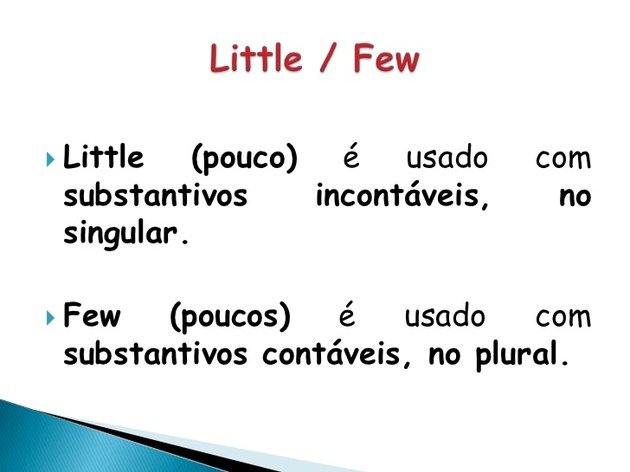Few e little
Few e little são quantifiers (quantificadores). O significado de few é poucos; poucas e o significado de little é pouco; pouca.
Usamos os quantificadores quando queremos fazer referência à quantidade de algo.
Antes de usarmos few e little, é importante verificarmos se o substantivo ao qual queremos nos referir é countable (contável) ou uncountable (incontável), pois few é usado com contáveis e little, com incontáveis. Veja um resumo na imagem abaixo.

IMPORTANTE: nem todos os substantivos contáveis da língua portuguesa são contáveis na língua inglesa. É preciso ter atenção para que o uso de little e few seja feito corretamente.
Confira a explicação abaixo e saiba como usar few e little.
Quando usar few e little
Saiba quando usar little e few e entenda a diferença entre os dois quantificadores.
Uso de few
A palavra few é usada com substantivos contáveis e significa poucos, poucas.
Exemplos:
- I know few people that would help. (Conheço poucas pessoas que ajudariam.)
- She has few friends. (Ela tem poucos amigos.)
- There are few employees at the company now because of the strike. (Há poucos funcionários na empresa agora por causa da greve.)
Observe que o uso de few indica uma conotação de certa forma negativa, ou seja, a palavra pouco acaba por estar associada a uma quantidade insuficiente de algo.
IMPORTANTE: o substantivo usado após a palavra few deve estar sempre flexionado no plural.
Uso de a few
Quando queremos indicar que há pouca quantidade de um determinado substantivo contável sem que essa quantidade necessariamente represente a ideia de insuficiência, de que a quantidade poderia ser maior, podemos usar a few.
A few também significa poucos; poucas. A diferença entre a few e few é:
- Few = poucos; insuficiente; poderiam ser mais
- A few = poucos; alguns; contrário de muitos. Funciona quase que com o mesmo sentido de “alguns”.
Exemplos:
- Few students solved that Math problem. (Poucos alunos resolveram aquele problema de matemática.) – poderiam ter sido mais alunos a conseguir.
- A few students solved that Math problem. (Alguns alunos resolveram aquele problema de matemática.) – não foram muitos os alunos que conseguiram.
Uso de little
A palavra little é usada com substantivos incontáveis e significa pouco ou pouca.
Exemplos:
- She put little milk in the jar. (Ela colocou pouco leite na jarra.)
- He drinks little water during the day. (Ela bebe pouca água durante o dia.)
- I have little money. (Eu tenho pouco dinheiro.)
IMPORTANTE: o substantivo usado após a palavra little deve estar sempre no singular.
Uso de a little
Quando queremos indicar que há pouca quantidade de um determinado substantivo incontável sem que essa quantidade necessariamente represente a ideia de insuficiência, de que a quantidade poderia ser maior, podemos usar a little.
A little também significa pouco; pouca. A diferença entre a little e little é:
- Little = pouco; insuficiente; quasa nada; poderia ser/ter mais.
- A little = um pouco; algum; contrário de muito.
Exemplos:
- I have little money. (Tenho pouco dinheiro) – tenho uma quantidade insuficiente; poderia ter mais.
- I have a little money. (Tenho algum/um pouco de dinheiro) – não tenho muito dinheiro.
Vídeo
Assista o vídeo abaixo e veja mais alguns exemplos de como usar few, little, a few e a little.
Exercícios
Faça os exercícios abaixo e teste seus conhecimentos sobre o uso dos quantificadores.
1. (EPCAR/2015) “There are a few ways to prevent cyberbullying” (line 31) is the same as
a) There are some ways to prevent cyberbullying.
b) There are many ways to prevent cyberbullying.
c) There are lots of ways to prevent cyberbullying.
d) There are no ways to prevent cyberbullying.
2. (Escola Naval/2010) Analyse the sentences below. Which alternative is correct?
a) A little people passed the exam because it was too difficult.
b) Few people passed the exam because it was too difficult.
c) Much people passed the exam because it was too difficult.
d) Many people passed the exam because it was too difficult.
e) A lot of people passed the exam because it was too difficult.Parte inferior do formulário
3. (EsFCEx/2010) Choose the alternative that correctly completes the sentences below in the right order:
We don't have __________ money, just __________ reais. Let's take only __________ milk.
a) many - few - a few
b) much - a few - some
c) a lot of - many - few
d) few - some - many
e) many - few - some
4. (EFOMM/2011) Choose the option which completes the sentences below correctly:
It is ________ use trying to change her mind.
Slowly, ___________children began coming to school.
Unfortunately, he had __________ friends.
Could you possibly give me ___________ help?
a) a little/a few/few/little
b) a little/a few/little/little
c) a little/few/few/a little
d) little/few/little/a little
e) little/a few/few/a little
Veja também: Comidas em inglês (food)
MUNIZ, Carla. Few e little. Toda Matéria, [s.d.]. Disponível em: https://www.todamateria.com.br/few-e-little/. Acesso em:



